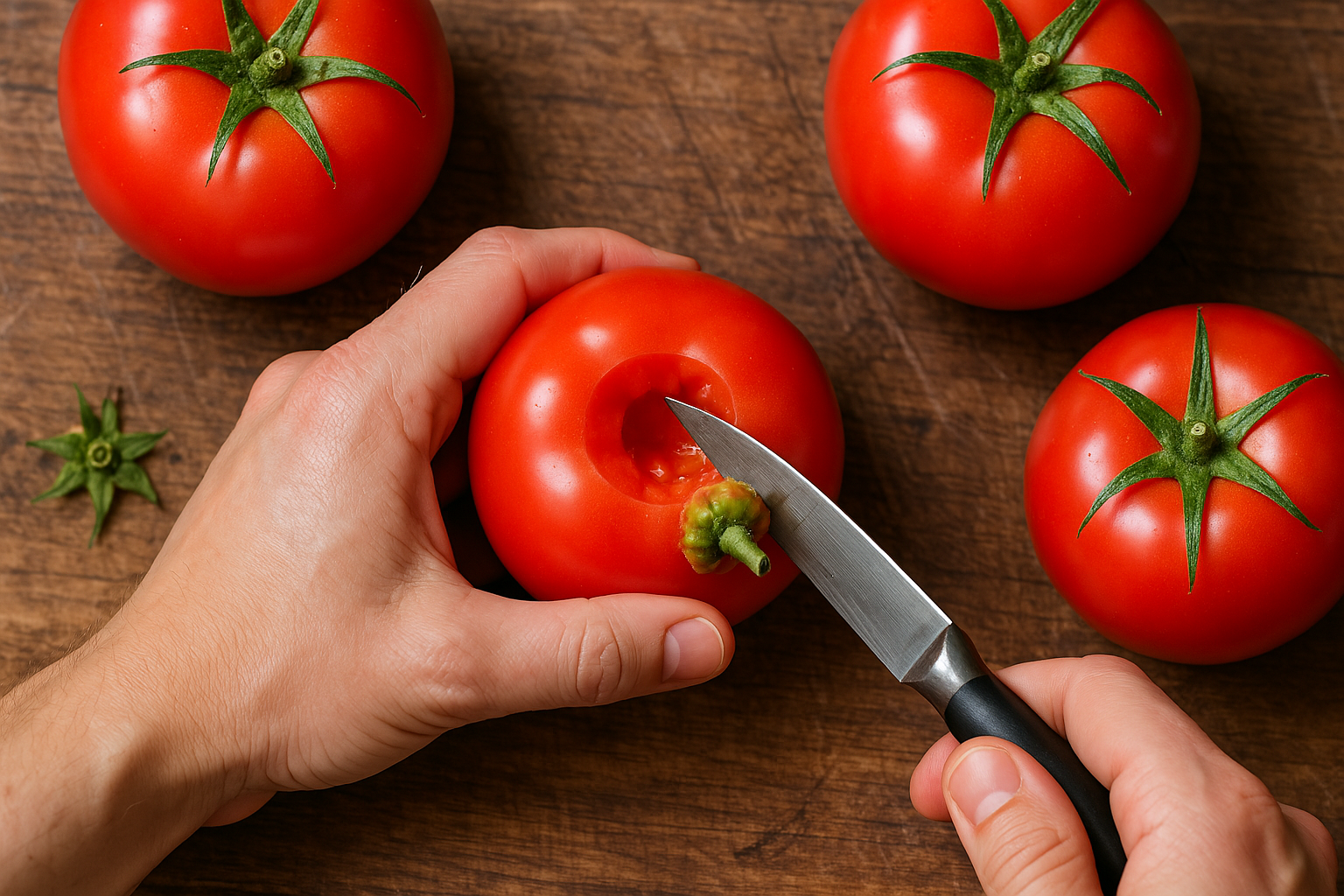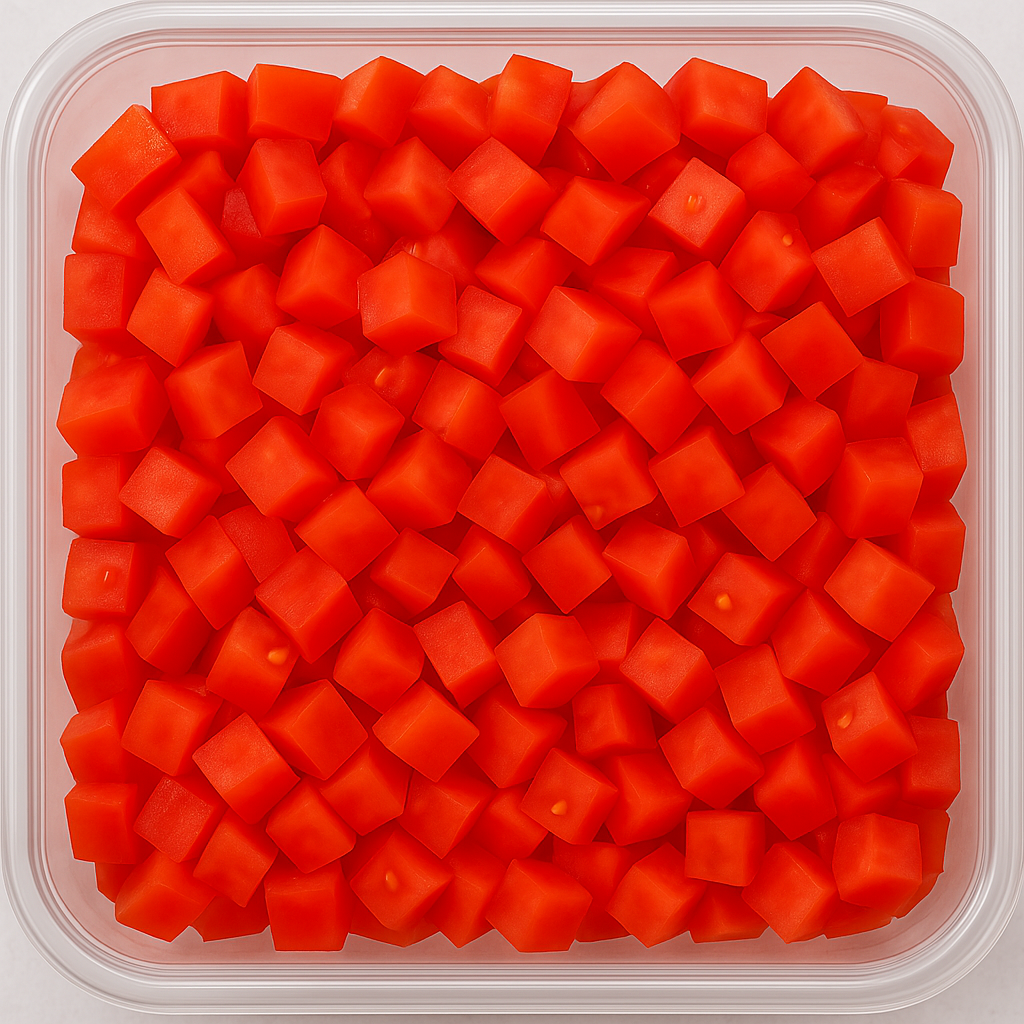Tomatoes are more than just a salad ingredient—they’re the juicy, sun-ripened centerpiece that brings color, flavor, and freshness to the bowl.
But behind every vibrant slice or perfectly diced cube lies a technique that can make or break your dish. Cut too roughly, and you risk a soggy mess – cut too timidly, and the texture falls flat.
Whether you’re layering heirloom slices for a Caprese or tossing cherry halves into a garden mix, knowing how to cut tomatoes with precision and purpose transforms your salad from simple to stunning.
In this guide, we will discuss the best tools, techniques, and tomato types to match every salad style—so your prep is as beautiful and balanced as your final plate.
Why Tomato Cutting Technique Matters
Table of Contents

Tomatoes are the soul of many salads—vibrant, juicy, and bursting with flavor. But their delicate structure means that how you cut them can dramatically affect both the texture and the visual appeal of your dish.
A well-cut tomato doesn’t just look good—it ensures balanced bites, prevents sogginess, and elevates the entire salad experience. Whether you’re layering slices for a Caprese or tossing cubes into a chopped veggie bowl, mastering tomato cutting is a small skill with big impact.
Choosing the Right Tomato for Your Salad

Not all tomatoes are created equal—especially when it comes to salads. The variety you choose should match the texture, moisture level, and visual style of your dish. Here’s a quick breakdown:
• Beefsteak Tomatoes- Large and juicy, ideal for thick slices in layered salads like Caprese or sandwiches.
• Roma (Plum) Tomatoes – Firm and less watery, perfect for dicing in chopped salads or salsas.
• Cherry and Grape Tomatoes – Sweet and bite-sized, best halved for quick, colorful salads.
• Heirloom Tomatoes – Gorgeous and irregularly shaped, great for rustic wedges that showcase their color and marbling.
When photographing or filming tomato prep, highlight the contrast between varieties—especially heirlooms—for a visually immersive experience.
Essential Tools for Cutting Tomatoes

The right tools make cutting easier and cleaner:
• Serrated knife – Best for slicing through tomato skin without crushing.
• Paring knife –Useful for coring and trimming.
• Cutting board – Preferably non-slip and easy to clean.
• Tomato corer (optional) – Helps remove the stem and core efficiently.
Always use a sharp knife to avoid tearing the tomato’s skin.
Prepping Tomatoes: Washing and Core Removal

Before cutting make sure you do the following:
• Wash thoroughly under running water to remove dirt and pesticides.
• Remove the core by slicing off the stem end and scooping out the tough center with a paring knife or corer.
• Dry gently with a paper towel to reduce slipperiness.
This step ensures cleanliness and makes cutting safer and more precise.
How to Slice Tomatoes for Layered Salads

For salads like Caprese or sandwiches:
• Place the tomato stem-side up.
• Slice vertically into even rounds, about ¼ inch thick.
• Use a gentle sawing motion with a serrated knife.
Uniform slices stack beautifully and hold their shape.
How to Dice Tomatoes for Chopped Salads

Diced tomatoes blend well with cucumbers, onions, and herbs:
• Cut the tomato in half horizontally.
• Scoop out seeds if you want a firmer dice.
• Slice each half into strips, then cross-cut into cubes.
Roma tomatoes work best here due to their lower moisture content.
Making Tomato Wedges for Rustic Presentations
Wedges are ideal for heirloom or garden salads:
• Cut the tomato in half vertically.
• Slice each half into 3–4 wedges depending on size.
• Keep the skin side down while cutting to maintain control.
Wedges highlight the tomato’s natural shape and color.
Halving Cherry and Grape Tomatoes for Bite-Sized Salads

These small tomatoes are great for quick salads:
• Place a few tomatoes between two lids or plates.
• Use a sharp knife to slice horizontally through the gap.
• Alternatively, cut each tomato individually with a paring knife.
Halves release less juice and are easier to eat.
Tips to Prevent Tomato Juice Mess
Tomatoes are juicy by nature, and slicing them can quickly turn into a splashy situation. Here’s how to keep your prep clean and controlled:
Use a Sharp Serrated Knife
A serrated blade grips the tomato’s skin without crushing it, allowing for a clean slice through the flesh. Dull knives tend to press and rupture the tomato, causing juice to squirt unpredictably.
Chill Tomatoes Before Slicing
Cool tomatoes firm up slightly, making them easier to slice cleanly. Just 15–20 minutes in the fridge can reduce juice runoff significantly.
Slice Over a Rimmed Cutting Board
Use a board with a juice groove or rim to catch excess liquid. This keeps your counter clean and prevents juice from running onto other ingredients.
Pat Tomatoes Dry First
If your tomatoes are freshly washed or extra ripe, blot them gently with a paper towel before slicing. This reduces surface moisture and helps the knife glide more smoothly.
Cut with the Stem Side Facing You
Starting from the bottom (opposite the stem) gives you more control and reduces pressure buildup inside the tomato, which can cause sudden squirts.
Use a Tomato Corer or Scoop
If you’re prepping tomatoes for stuffing or sauce, remove the core and seeds first. This minimizes mess and gives you cleaner slices or chunks.
Wrapping Up
Cutting tomatoes for salad isn’t just a prep step—it’s a craft. From choosing the right variety to mastering the slice, each decision shapes the final dish.
With the right tools, a sharp knife, and a clear sense of your salad’s style, you can turn a simple tomato into a showstopper.
Leave a Reply